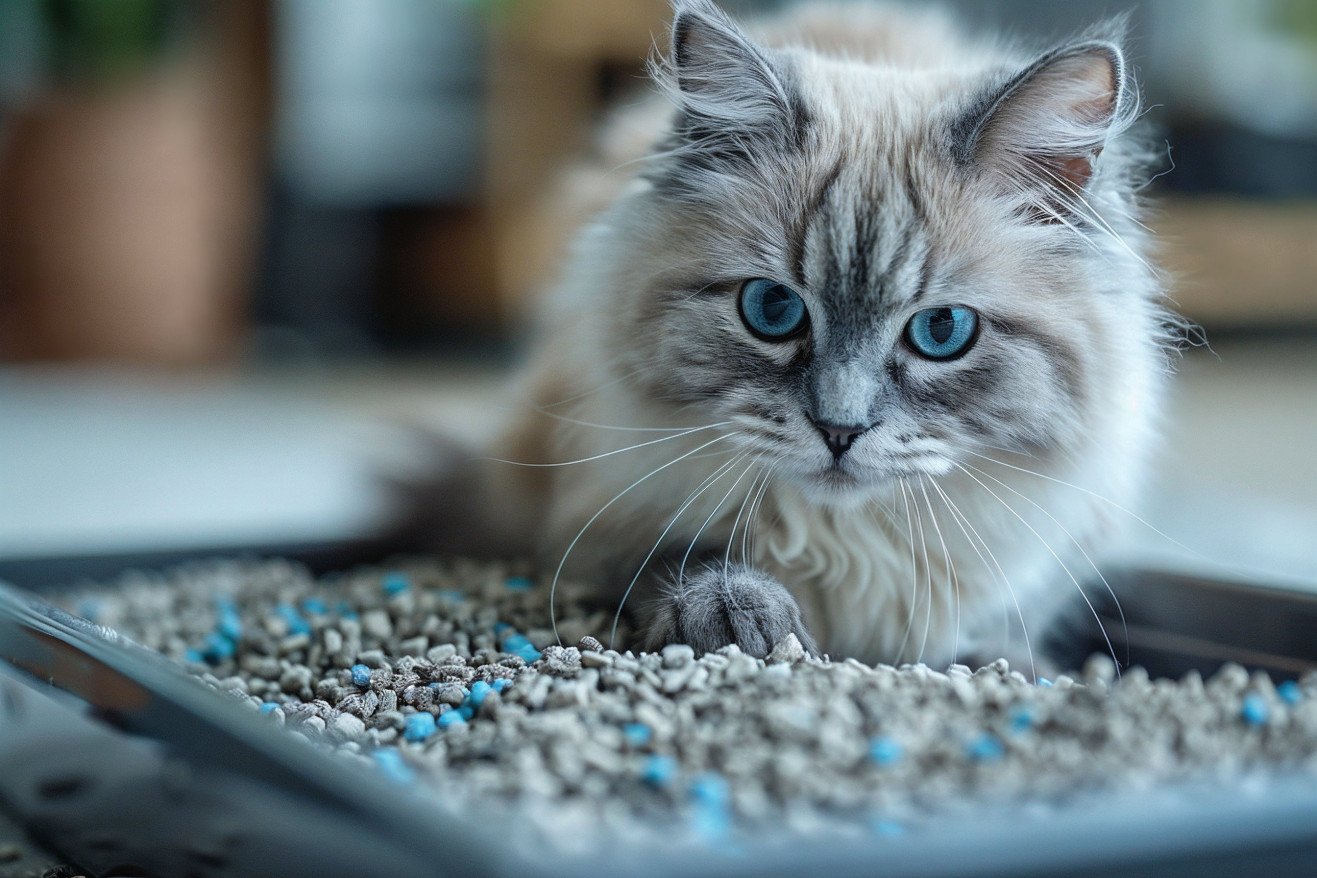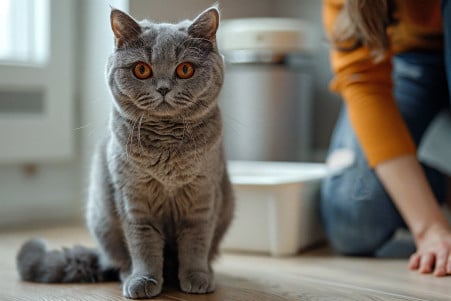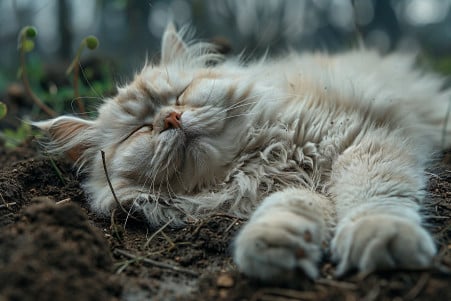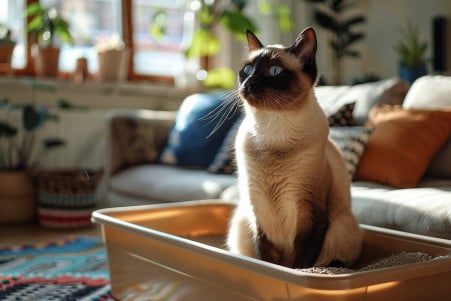Why Do Cats Bury Their Poop? Exploring Evolutionary Instincts
30 March 2024 • Updated 29 March 2024

If you've ever wondered why your cat seems to take a little longer to cover up their business in the litter box, there are several evolutionary reasons behind their instinctual poop-burying behavior. In addition to hiding their waste from potential predators, cats also bury their poop to mark their territory with pheromones and to keep their living space clean, especially since they can come back to the same spot to go to the bathroom.
Although this behavior may be a reflex that's been passed down from their wild ancestors, we'll take a look at the many scientific studies that have been conducted to determine the specific factors that drive this odd feline behavior. With the help of animal behaviorists, ecologists, and researchers who specialize in cat genetics, we'll uncover the adaptive benefits and biological factors that have led to this instinct in house cats.
Why do cats bury their poop?
Territorial Marking and Social Dynamics
Cats' instinct to bury their poop is closely tied to their territorial nature and social dynamics. According to Live Science, a cat's feces is rich in pheromones, which are chemical scent markers that help the animal stake out its territory. In the wild, dominant cats like lions and tigers often leave their feces out in the open to let others know they've claimed an area.
In a multi-cat environment, cats' tendency to bury their feces can be a sign of submission to more dominant cats. Subordinate cats will bury their feces to avoid confrontation with the alpha cat, says zoologist Desmond Morris, who is cited by Live Science. On the other hand, some domestic cats may leave their feces uncovered to assert their dominance and mark their territory, which would be an example of them imitating the behavior of wild cats.
That said, other things like the size and cleanliness of the litter box, as well as the cat's health, can also play a role in this behavior. According to The Spruce Pets, a cat may not be able to bury its waste if the litter box is too small and doesn't allow the cat to turn around and cover it. Meanwhile, a cat that's in pain, discomfort, or has been declawed may be less likely to spend time in the litter box covering its poop.
So while the instinct to bury poop is innate, it's also clear that a cat's environment and the social dynamics within its home can influence whether and how this behavior is expressed. This is important to keep in mind when you're trying to encourage healthy litter box habits.
Litter Box Preferences and Environmental Factors
If a cat doesn't like the texture or smell of the litter, they may not bury their poop, according to Catster. If a cat feels unsafe or stressed in the litter box area, they may not bury their poop, either. The Spruce Pets explains that cats who feel vulnerable in the litter box may not want to take the time to cover their poop.
In a multi-cat household, one cat may prevent other cats from using the litter box properly, according to the ASPCA. This can lead to conflicts that cause cats to stop burying their poop. It's important to make sure that the litter box environment is clean and comfortable to encourage this natural behavior, according to Daily Paws.
The size, location, and cleanliness of the litter box can all affect whether a cat will bury their poop. Catster explains that if a litter box is too small, a cat may not be able to turn around to bury their poop. Making sure that the litter box is a safe, comfortable place and that any other issues are addressed is important to encourage a cat to bury their poop.
The Impact of Early Socialization and Training
Kittens pick up on the instinct to cover their poop from their mothers when they are very young, according to Catster. However, if indoor cats aren’t properly socialized, they may not develop this instinct as strongly. As Daily Paws explains, "If your cat's mother didn't teach her the behavior [as a kitten], it may not be as strong of a need—especially in indoor life."
Positive reinforcement and consistent litter box training can help encourage poop-burying habits in cats. However, as The Spruce Pets points out, "Cats that choose not to cover, or leave a deposit outside the box, may simply be doing what comes naturally." That said, it’s important to make sure that any medical or behavioral issues are addressed since pain or discomfort could make a cat less likely to spend time in the litter box.
In the end, it’s important to be patient and understanding when trying to encourage cats to engage in their natural behaviors. However, if you take the right approach, you can help your cat feel safe and secure enough to engage in this instinctual poop-burying behavior.
Health Considerations and Behavioral Patterns
Changes in a cat's poop-burying behavior can be a sign of health issues, according to Catster. Health problems such as urinary tract infections, gastrointestinal issues, and arthritis can impact a cat's ability to bury their poop. Moreover, The Spruce Pets points out that cats that bury their poop too much or too often may be experiencing stress or anxiety.
Regular vet visits and monitoring a cat's bathroom habits can help ensure that any health issues are caught and treated early. According to the Cornell Feline Health Center, repetitive behaviors like over-grooming can sometimes be a sign of a medical or psychological issue. Keeping an eye on a cat's litter box and how often they use it can help pet parents catch potential issues before they become more serious.
Knowing what to look for in terms of health issues related to poop-burying behavior can help cat parents ensure their pets are as healthy as possible. With the right care and attention from a vet, this instinct can be managed while ensuring that any health issues are addressed.
Conclusion: Understanding and Accommodating a Natural Instinct
Poop-burying is a deeply ingrained, natural behavior in cats with evolutionary roots. While the behavior may seem strange to humans, it serves important purposes for felines.
Providing a suitable litter box environment and addressing any underlying issues can encourage this instinct. Observing and understanding a cat's elimination habits is key to maintaining their health and well-being. With patience and knowledge, cat owners can accommodate this natural behavior and ensure a harmonious living situation.


